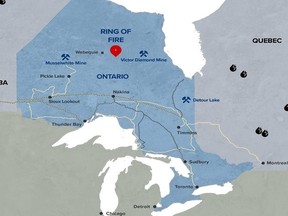
Contents of the article
Another northern Ontario First Nation has signed a partnership agreement with the province to speed up construction of a road to the mineral-rich Ring of Fire, and its chief said he hopes to begin construction next summer.
Advertisement 2
Contents of the article
Marten Falls First Nation will receive nearly $40 million for a multi-purpose community center, materials for other infrastructure projects, including this season's winter road, and other priority projects, Chief Bruce Ahnepineskum said.
Contents of the article
Contents of the article
The deal also includes money to rebuild First Nation's airport terminal and pave the gravel runway, as well as money to build an aggregate procurement project. The community center will also be used to educate people about upcoming road work and other projects Marten Falls is working on.
“We have to deal with very expensive air travel to get in and out of the community, and it's taking a great and direct toll on our health,” Ahnepineskum said at a news conference in Queen's Park.
Contents of the article
Advertisement 3
Contents of the article
“We can't easily jump in the car and then drive down the street to make a doctor's appointment any day of the week. This has been a huge, huge hassle for our members.”
Achnepineskum said the deal represents economic reconciliation and added that it also cements a relationship with a province that has historically left the community behind.
Premier Doug Ford said the deal is a “landmark moment” in northern Ontario's path to prosperity.
“I'm determined, with the cooperation of the chief and the council, we're going to make a difference in the lives of the young people there,” Ford said.
In turn, the community will complete an environmental assessment of the Marten Falls access road by February and hopes to begin construction by August. That depends on the province reaching an agreement with the federal government to eliminate what it calls duplicative environmental assessment work.
Advertisement 4
Contents of the article
Marten Falls is about 450 kilometers north of Thunder Bay, Ontario, accessible by winter road for a month or two of the year, but otherwise only accessible by air.
The province recently signed a similar agreement with Webequie First Nation, located north of Martin Falls.
Both are conducting an environmental assessment of three roads that would connect to Webeki to the north, mining activity in the Ring of Fire, Marten Falls to the south and eventually the provincial highway system.
The province believes the critical minerals in the ground are theirs to give away, said New Democrat Sol Mamakwa, who represents the Ring of Fire country of Kiiwetinung.
“I always believe that rights holders should have a voice, and I respect their decision to participate in the government process,” he said.
Advertisement 5
Contents of the article
“However, we know that neighboring communities that may be impacted must be involved, and without their participation these projects will not proceed.”
He said the lands are worth more than $39.5 million each, which the province is deeding to Marten Falls and Webeki.
“They need to be protected for future generations,” Mamakwa said.
Liberal Parliamentary Leader John Fraser welcomed the deals with both Webecki and Marten Falls, although he said Ford still had a lot of work to do with the other 131 First Nations in the province.
“It doesn't address the problem that the government really has with First Nations, and that goes back to Bill 5, which is generally about the government being able to do whatever it wants, whenever it wants, wherever it wants,” he said.
Advertisement 6
Contents of the article
“And at the heart of this problem, the real problem, is trust.”
The Ford government passed Bill 5 last spring. The legislation specifically allows the government to create so-called “special economic zones” where it can suspend any or all provincial and municipal laws. It was passed to speed up the approval and construction of large projects, especially mines.
The passage of the bill sparked protests from most indigenous peoples, who said the law violated their rights and ignored their concerns.
The province has not yet declared any special economic zones, although Ford said the Ring of Fire would be the first.
Read more
Contents of the article









